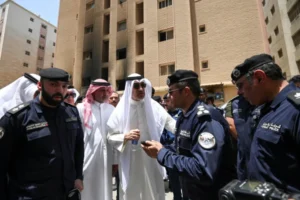Kuwait fire: At least 41 people lost their life when a terrible fire broke out in a six Storey building in Kuwait’s southern Mangaf area on June 12, 2024.
VIDEO | Visuals of fire in a building housing workers in Kuwait's Mangaf City.
Over 40 people, majority of them Indians, were killed in the devastating fire in the building and the number of deceased is expected to go up.
(Source: Third Party) pic.twitter.com/yfOSbngub0
— Press Trust of India (@PTI_News) June 12, 2024
Deputy Prime Minister Sheikh Fahad al-Yousuf al-Sabah ordered the arrest of the building’s owner during a visit to the site.

“Unfortunately, the greed of real estate owners is what leads to these matters,” said Sheikh Fahad, who also runs the interior and defence ministries.
The Kuwait Fire Department is responsible for responding to such incidents and ensuring the safety of the public. If you are at the site and witness a building fire, you should immediately call the Fire Department at 181 or 112.
India’s response to the tragedy
The fire mishap in Kuwait City is saddening. My thoughts are with all those who have lost their near and dear ones. I pray that the injured recover at the earliest. The Indian Embassy in Kuwait is closely monitoring the situation and working with the authorities there to assist… https://t.co/cb7GHN6gmX
— Narendra Modi (@narendramodi) June 12, 2024
The Indian embassy has released the following emergency helpline number: +965-65505246. Adarsh Swaika, the Indian envoy, also visited the site to ascertain the situation.

In connection with the tragic fire-accident involving Indian workers today, Embassy has put in place an emergency helpline number: +965-65505246.
All concerned are requested to connect over this helpline for updates. Embassy remains committed to render all possible assistance. https://t.co/RiXrv2oceo
— India in Kuwait (@indembkwt) June 12, 2024
The Union government is sending Kirti Vardhan Singh, the newly sworn-in Minister of State (MoS) for External Affairs, to city to oversee the relief operations and coordinate with local authorities for an early repatriation of the mortal remains of those who have died in the incident.
VIDEO | "The PM has called us for a meeting. Following the briefing, we will immediately go to Kuwait," says MoS External Affairs, Kirti Vardhan Singh (@KVSinghMPGonda) on death of several Indians in Kuwait apartment blaze. pic.twitter.com/DoBxVd9jLB
— Press Trust of India (@PTI_News) June 12, 2024
The Indian nationals, among 49 victims of the tragedy, also include people from states such as Tamil Nadu and Uttar Pradesh. As many as 11 people from Kerala are among at least 40 Indians killed in the fire incident that took place migrant worker’s building.
Kerala Chief Minister Pinarayi Vijayan has sought the central government and Indian Embassy’s assistance following the tragic fire
The incident highlights the challenges faced by migrant laborers in the region, where they often live in overcrowded conditions.
Indians constitute 21 per cent (1 million) of the total population of Kuwait and 30 per cent of its workforce (approximately 9 lakhs).
Migrant workers play a crucial role in the global economy, but unfortunately, they often face significant risks and challenges.
- Global Migration Trends:
- Demand for Migrant Labor:
- The COVID-19 pandemic highlighted the essential role of migrant workers in various sectors.
- For instance, foreign doctors account for 33% of physicians in the United Kingdom, and there is overall reliance on foreign healthcare workers in Europe and the United States.
Indian migrant workers have made substantial contributions to the economic development of the Gulf States. However, there has been increasing international scrutiny and condemnation of the treatment of blue-collar and domestic expatriate workers in the region1
The future of India-Gulf migration is clouded by various factors including economic slowdowns, fluctuating oil prices, changes in Gulf labor policies, and the Coronavirus pandemic.
There has been a significant decrease in the number of blue-collar workers migrating to the Gulf States. This is reflected in the sharp decline from its peak in 2014 in the number of Indians granted emigration clearances to work in the Gulf.
There are many reasons behind the death of Indian laborers including dangerous working circumstances, intense physical and mental stress, lack of medical awareness, debt, and stress.









